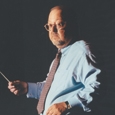Back in 1962 at the Midwest Convention, I watched Harry Begian conduct the Cass Technical High School band on the Hindemith Symphony for Band. Being a new band director I had never heard of Harry Begian or Cass Tech, but I had never heard a high school performance of this quality and was astounded by what I heard.
I tucked the experience away and for 46 years I have been gripped by what I heard. I was amazed that an ensemble this large could perform so musically, be perfectly disciplined, and obviously enjoy every second they made music together. This was the magic of Harry Begian. There were no wasted moves or beats from his baton, and this was the model I wanted to follow for my musical career, regardless of the level of the ensemble I led.
I went on and taught elementary band for seven years, then 15 years as a high school band director, but I never met Harry Begian. In 1983, I became director of bands at Marquette University.
One of my pet peeves as a high school band director was when a university director would ask me to send my best students to play in an honors band. I believe this can create a sense of elitism within a band. I never responded to such requests and still believe that what I do for one student should be done for all. I started a clinic at Marquette and invited directors to bring the entire band for a one-hour clinic with an outstanding, nationally known clinician. I bounced the idea off of some good friends who were high school directors, and they loved it. The Marquette University Concert Band Festival was born. My plan was to meet Harry Begian and invite him to our first festival. For two days at the Midwest Clinic I tried to find him. I finally located Harry Begian, introduced myself, and explained the impression his 1962 performance had made on me. I instantly had his full attention. He invited me for coffee and we discussed my plan. He consented to be our first clinician and told me that we were much alike and had both “zigged when everyone else zagged.” I wiped my brow and took that as a compliment.
A most wonderful friendship began over that cup of coffee, and Dr. Begian came to Marquette University for three years in a row.
At the second festival, one director had his band on the stage, tuned and ready to begin, but instead of conducting them, walked over to Harry and said, “Dr. Begian. I have been waiting for this clinic for six months and wonder if you would show me how you prepare and warm up a band?” Harry was thrilled and this was the greatest clinic I have ever witnessed.
That same year we took him over to meet the Milwaukee Police Band, which was directed by a fellow Wisconsin-Milwaukee alum, Officer Dennis Benjamin. While Harry worked with the band, a relatively experienced trumpet-playing police detective began to challenge him on a conducting beat. Harry explained very clearly and succinctly that all he needed to know is that beat one is always down. Officer Benjamin later hung a 20-foot banner on the wall of their rehearsal room: “One Is Always Down” in case anyone forgot.
I have made a point of calling Harry at least every six to eight weeks to ask how he is and have often sent concert programs and recordings to him. Harry sent me an autographed set of his outstanding recordings with the Univer sity of Illinois Band. I cherish these and the articles he sent about Civil War Band music, which is an enduring interest of mine. Harry Begian was truly a shining star in my life, and I shall miss him.





